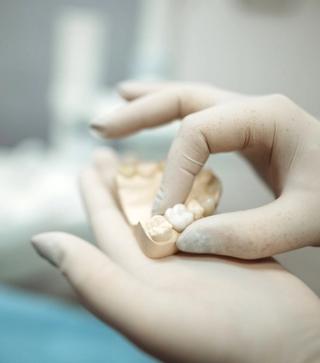
A dental crown is a thin, custom-made cover that snugly encases your existing tooth, adding strength, protecting your natural tooth, and enhancing its appearance.
The knowledgeable team at National Dental Care Erina is experienced in dental crown procedures, customised to meet your individual dental needs.
What is a dental crown?
A dental crown is like a thin shell that fits over your natural tooth. It is made especially for your teeth so you won’t feel any real difference - and because it looks completely natural, no one will even know it’s there!

Dental crowns are usually made from porcelain, which is a very strong material that can be matched to your natural tooth colour. However, you can also choose to have a dental crown made from gold, which doesn’t have the same natural look, but does offer added strength. That’s why gold is typically used for back teeth that can’t be seen when you smile, but do more of the heaving lifting when it comes to chewing.
A dental crown is usually required when your natural tooth is weakened, broken or damaged in some way. For example, many people who have a root canal treatment will get a dental crown placed over the tooth for added strength.
A dental crown can also improve the appearance of stained or misshapen teeth. For example, if a tooth is discoloured, a dental crown can be fitted over the natural tooth for a whiter smile if standard teeth whitening is not sufficient.
Dental crowns are a great way to repair a compromised or damaged tooth, and they offer many benefits for your oral health. In fact, a crown can be the difference between saving a natural tooth and having it removed.
Advantages of a dental crown
A dental crown is an excellent solution to a number of problems, and offers a variety of advantages.

- Reinforced Protection: The main benefit of a dental crown is its ability to strengthen a damaged or injured tooth, preventing possible issues arising from tooth weakness.
- Enhanced Aesthetics: Dental crowns can effectively conceal misshapen or discoloured teeth, resulting in a more radiant and whiter smile.
- Exceptional Durability: With proper maintenance, a well-fitted dental crown can provide a lifetime of dependable service, offering a long-lasting solution that requires minimal care after its initial placement.
How much does a dental crown cost?
A dental crown will vary in cost depending on which tooth or teeth are involved and your private health insurance.
During your initial consultation at National Dental Care Erina, our experienced dental professionals will evaluate your specific needs and provide you with a personalised treatment plan along with an accurate cost estimate.
Same-day crowns with CEREC
Experience the convenience of our advanced CEREC technology at National Dental Care Erina, which lets you get your dental crown in just one visit!
CEREC is a fantastic choice for fixing damaged or decayed teeth and improving the function and appearance of your natural teeth. Plus, it’s a hassle-free solution that allows you to have your new crown made and fitted on the day of your appointment - making it ideal for busy lifestyles.

What to expect from your dental crown appointment
Wondering what’s involved in a dental crown treatment? Here’s a step-by-step overview of the process:
- Preparation: Prior to your appointment, it's advisable to have a meal and drink to ensure your comfort.
- Oral Hygiene: Maintain excellent oral hygiene by brushing and flossing your teeth before the procedure.
- Anaesthesia: Your dentist will administer a local anaesthetic to numb the treated area, ensuring your comfort throughout.
- Tooth Preparation: A thin layer of your tooth will be carefully removed, shaping it to accommodate the dental crown.
- Impression: A precise mould of your prepared tooth will be taken to ensure an accurate fit for the crown.
- Temporary Crown: A temporary crown will be attached and adjusted to align with your bite for interim use.
- Discomfort: While the procedure may induce some discomfort, it should not be painful. You can raise your hand at any time if you need a short break.
- Numbness: Expect the area to remain numb for several hours following the procedure.
- Post-Procedure Tenderness: It's normal for the treated area to feel tender for a day or two after the procedure.
- Final Appointment: During the second appointment, your dentist will remove the temporary crown and evaluate the fit of the permanent crown.
- Permanent Crown Attachment: The permanent dental crown will be affixed using dental cement, and its shape will be refined to ensure a perfect fit for your bite.
Looking to improve the appearance and durability of your teeth? Book a consultation today to learn about the advantages of dental crowns and start your journey towards a healthier smile.
Frequently asked questions
At National Dental Care Erina, we offer a number of solutions to help cover the cost of dental treatment.
Payment Plans: Our payment plans, SmileFund and Afterpay, provide a flexible, interest-free payment option, ensuring you receive the care you need without worrying about the cost.
SmileFund is our exclusive payment plan that provides interest-free payments for unexpected or unplanned treatments for up to 18 months.
If you use Afterpay, you can split your treatment cost into four equal, interest-free instalments over a few weeks.
Health Funds: We accept all major health fund providers. Plus, our HICAPS facilities allow you to claim your rebate on the spot after your treatment – there’s no waiting around.
National Dental Care Erina is also a preferred provider for many health funds - so if you’re with one of our preferred provider funds, you can use your dental extras and minimise out-of-pocket expenses.
We're here to help you make the most of your dental benefits.
No, getting a dental crown is not painful, as your dentist will give you a local anaesthetic to numb the area.
It may be uncomfortable to sit in the chair with your mouth open during treatment, but you can put your hand up for a break at any time. Also, our team of caring professionals will help to ensure your comfort throughout the entire process.
Crowns are usually suitable for teeth that have been heavily restored with previous fillings, or for teeth that have severe decay. The most common reason a crown fails is not the crown itself, but the tooth underneath.
If the crown does fail, you can often have it replaced. There is no set time to replace crowns - and with good oral hygiene and regular check-ups, a crown can typically last for many years.
Proper care - including regular brushing, flossing, and dental check-ups at National Dental Care Erina - can help your dental crown to last as long as possible.
Yes. A dental crown can greatly improve the strength, health, and appearance of your natural tooth. It’s a good solution for a number of issues, so be sure to discuss getting a crown with your dentist. They may be able to offer alternative solutions such as dental veneers, or explain why a crown is the best option for your needs.
While getting a dental crown is a standard and generally safe procedure, it's important to be aware of potential side effects that may occur. Understanding the Limitations of Dental Crowns
- Temporary Tenderness: After the dental crown procedure, it is common to experience temporary tenderness in the area of the treated tooth. This discomfort usually goes away within a day or so and can be managed with over-the-counter pain relief medications in the meantime.
- Discomfort Post-Anesthesia: As the effects of anaesthesia wear off, you might experience mild discomfort. If so, it’s best to contact your dentist as soon as possible for an evaluation. Occasionally, adjustments may be needed to ensure a better fit of the crown to your tooth.
- Crown Damage: Over time, your dental crowns may become damaged, such as chipping, breakage, or even detachment. While this isn’t common, it can be a result of regular wear and tear. Practising good oral care can significantly reduce the risk of these issues. In case of crown damage, your dentist will either repair and reattach the crown or make a new one as needed.
It's essential to maintain good oral hygiene practices and attend regular check-ups with your dentist in Erina to ensure the longevity and wellbeing of your dental crown.
